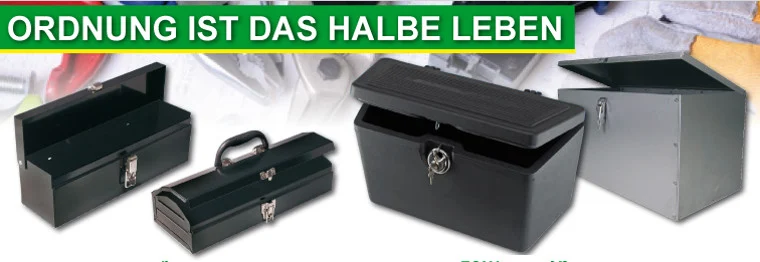08/11/2024
Tool - Maintenance Tips
Source: Philipp Riedl
Tools are indispensable in everyday life for every farmer, DIY enthusiast, and business owner, and are often the last resort in an emergency. Tools are also used daily in the home – often without us even noticing. For this reason, we've compiled some general tips and tricks on the topic of tools for you.
As a small introduction, a sentence that proves true again and again: "Treat your tools well, and they will serve you well and bring you joy for a long time!"
Proper use, storage, maintenance, and care of the tool ensure its functionality and longevity. We'll try to shed some light on these aspects in this topic.
Workshop equipment
Many workshops, whether at home, in a business, or on the farm, often look untidy. The workbench is half-filled with small parts, hand tools, and unfinished workpieces. Often, the mere sight of the chaos can put a damper on any tinkering, crafting, or work.
The disorder creates three problems:
- The first is the unnecessarily long search for suitable tools or materials, which can sometimes take longer than the work process itself.
- The second is a space issue—where should the tools be stored? Where should the workbench be used when the workbench is full?
- And last but not least, there is of course the safety aspect - the risk of injury from hand tools, be they mechanical or electrical, in a messy workshop should not be underestimated!
For this reason, it's a good idea to establish a (storage) system in your workshop and organize it properly. If your tools are always in their designated place, you'll quickly reach for them automatically, saving you a lot of time on your projects.
To start with, you should completely clear out your workshop and use this opportunity to sort out what you still need or dispose of things that have accumulated over time.
This process alone usually creates a lot of space. If you're still short on space, you can create new storage space – double-door cabinets, wall shelves, drawer units, or even homemade boards for hanging appliances or tools can all help. As a quick tip, we can also recommend a standard household magnetic strip (these are actually designed for holding knives) – this is an easy and inexpensive way to store individual keys, pliers, and other metal tools.
When setting up the appliance, care should also be taken to ensure that live devices do not come into contact with metal furnishings. Liquids, oils, paints, solvents, adhesives, etc. should be stored in a separate (preferably lockable) cabinet.
Often, after completing a job, you're under time pressure and want to install or use the repaired or newly created workpiece as quickly as possible. However, you shouldn't forget to put the tools you used back in their place or, for example, quickly sweep up after sanding. This only takes a short time and prevents "creeping chaos" in the workshop.
By following the steps listed above and using your own system, you'll save yourself a lot of work and stress. You'll definitely feel a lot more comfortable in your "new" workshop!
Tips about the toolbox

Finally, a little tip: Put a piece of chalk or silicate pad in the case; these absorb moisture from the air and prevent the tools from rusting (silicate pads are often found when you buy shoes or clothing; they also serve the purpose of absorbing moisture).
You can find all products on this topic here: Tools and machines
